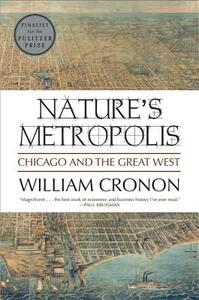Take a photo of a barcode or cover
This is a classic economic/environmental history of the late 19th century U.S. Through the story of Chicago, Cronon argues that capitalism reshaped the nature of the American West.
But this book is long, and I don't personally enjoy economic history. :)
But this book is long, and I don't personally enjoy economic history. :)
challenging
informative
inspiring
reflective
medium-paced
Banger! The only thing I will say is the argument about the waterways to railroad changes started to get repetitive as it was the same for every commodity/market Cronon examined
An interesting look at how Chicago shaped, and was shaped by, it's "hinterlands." By following commodity flows such as grain, lumber, and meat, you see how the Midwest grew to its current form. It illuminated not just Chicago's development but also those of untold rural communities like the one I grew up in in Iowa. It is a long (and sometimes repetitive) read but in the end rewarding.
challenging
informative
slow-paced
Essential urban history read.
This book is both an urban and a natural history of Chicago, because the author sees the two as the same — or at least part of the same continuum. The author describes Chicago’s advantage in simple terms: railroads, geography, and economies of scale, and goes into detail about all of the factors that led to Chicago’s rise.
This book is both an urban and a natural history of Chicago, because the author sees the two as the same — or at least part of the same continuum. The author describes Chicago’s advantage in simple terms: railroads, geography, and economies of scale, and goes into detail about all of the factors that led to Chicago’s rise.
challenging
informative
slow-paced
informative
medium-paced
informative
slow-paced
informative
medium-paced
"In bringing these goods to rural communities throughout the Great West, merchants supplied the other side of the exchange relationship that drew so much western produce to Chicago, sustaining and motivating rural and urban production alike. The elaborate hierarchy of central places, from the largest metropolis down to the smallest town and most remote rural farm, existed largely to sustain this movement of goods and produce shuttling between city and country."
Cronon reveals the dependent relationship between city and country, while also showing that what we often think of as "nature" is really "second nature", in that it has been developed and transformed as a facsimile of what was originally there. The country has been formed to provide goods and produce to the city, which in turn provides products and services back to the city. The divide between city and country is not a stark line - instead, they are teammates who help each other.
I love that this book shows the rise and decline of Chicago as the emblematic "city" - it is both a stand-in for any of the "gateway cities" like St. Louis, Omaha, Cincinnati, and others, but has its own unique place due to both its natural geography and developed geography (such as the railroad) thanks to advancements in technology. As the city changed, the country followed.
Cronon reveals the dependent relationship between city and country, while also showing that what we often think of as "nature" is really "second nature", in that it has been developed and transformed as a facsimile of what was originally there. The country has been formed to provide goods and produce to the city, which in turn provides products and services back to the city. The divide between city and country is not a stark line - instead, they are teammates who help each other.
I love that this book shows the rise and decline of Chicago as the emblematic "city" - it is both a stand-in for any of the "gateway cities" like St. Louis, Omaha, Cincinnati, and others, but has its own unique place due to both its natural geography and developed geography (such as the railroad) thanks to advancements in technology. As the city changed, the country followed.
Densely beautiful, congealed with ideas and epiphanies which unfurled page by page. Quite a grand book, a whole city traced and captured in one volume- that one person can hold and make sense of so much information- a dizzying array - amazes me. Ideas about nature, second nature. Navigating pre-Chicago (hopes pinned to landscapes; a city coming into being after people believed it was destined to be, and so it formed). The grain markets (golden torrents), futures (abstractions - commoditization, the way a product can be distanced from its producer, the way you can invest in something which you never see, never physically touch, futures standing in for the physical grain); railroads (creation of time zones-noon itself displaced, land partitioned, distance halved while other distances created); meat markets (freezer carts upending seasons); bison decimated in the plains; different types of wheat depending on fires or settlers; grain moving in sacks to torrent. etc. “Annihilation of space and time." Capitalism creates forgetfulness. The logic of capital becoming part of society.


